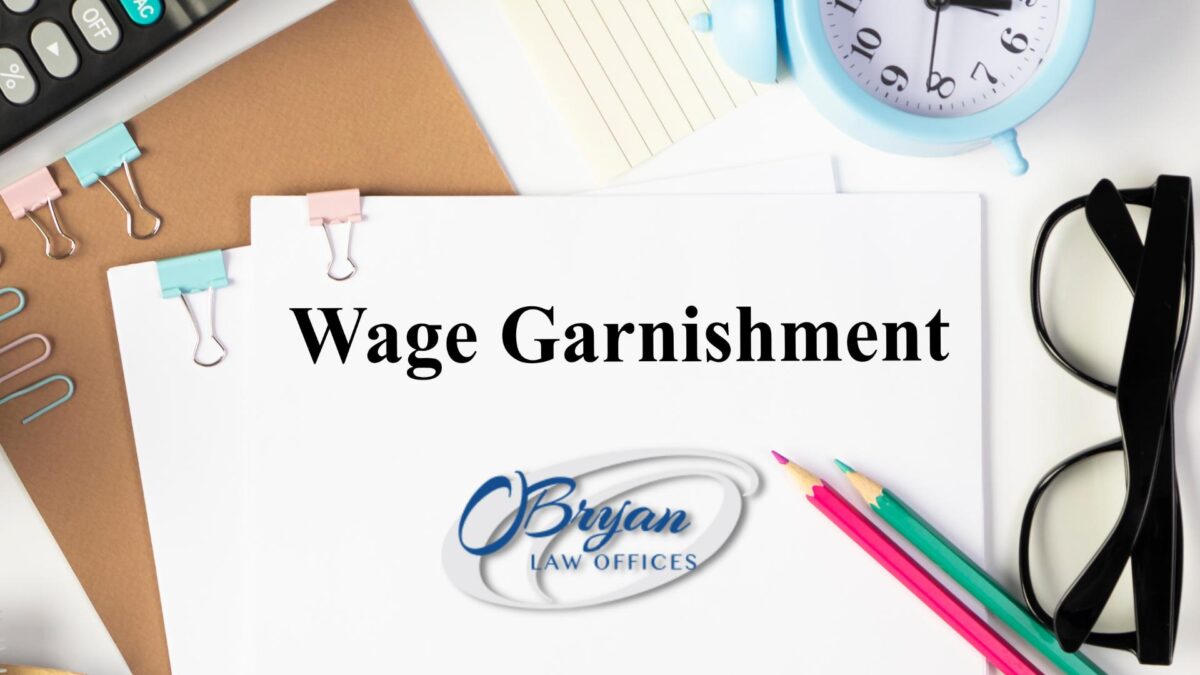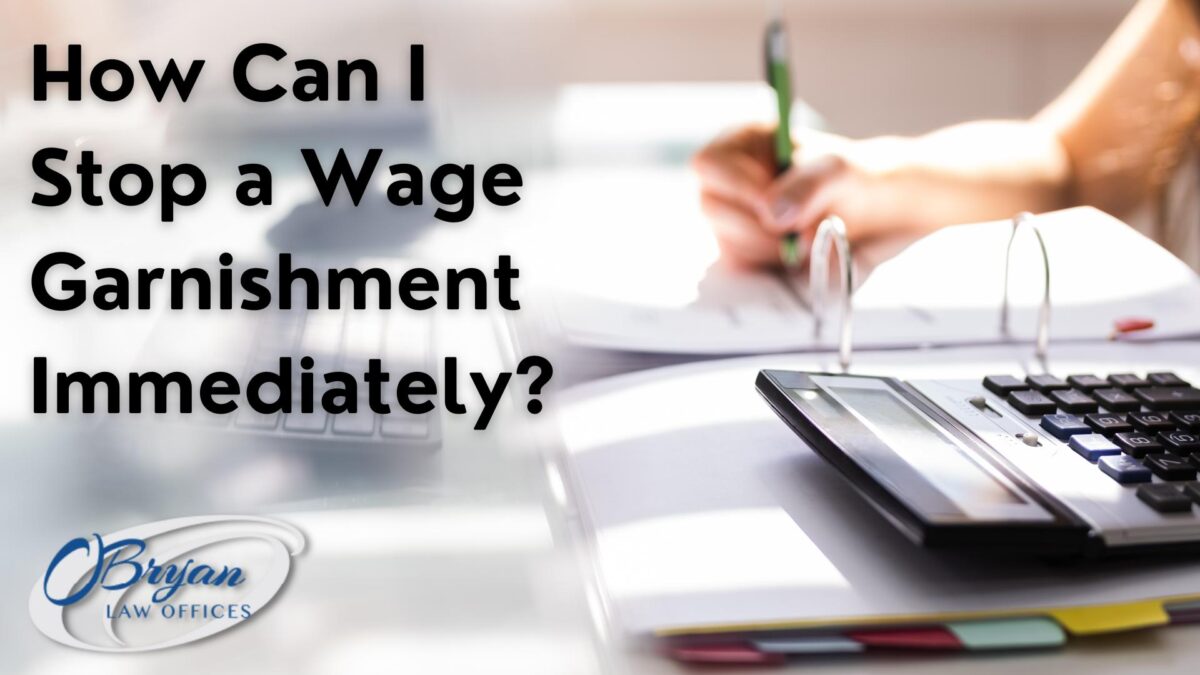If you need to stop a wage garnishment in Kentucky immediately, the fastest and most reliable option is to file for bankruptcy.
This triggers an automatic stay, a legal order that forces most creditors to halt wage garnishments and other collection actions right away.
In some cases, you may also be able to file an Affidavit to Challenge Garnishment with the court within 10 days of being served, which can temporarily stop the process and give you a chance to present your case.
While bankruptcy is often the most effective solution, it’s not the only one. You may be able to:
- Pay the debt in full,
- Negotiate a repayment plan, or
- Challenge the garnishment if the amount is wrong or the funds are exempt
The key is acting quickly — and the best way to protect your paycheck is to speak with experienced bankruptcy lawyers in Louisville right away.
Call O’Bryan Law Offices at (502) 339-0222 for immediate help stopping wage garnishment and protecting your income.
What Is Wage Garnishment?
Wage garnishment is a debt collection tool that creditors use to collect unpaid debts. If you have debt with a creditor, they can file a lawsuit against you to try and collect the debt. If they win the judgment, debt collectors can take money out of your paycheck to pay back the debts owed. Once the decision is granted, your employer must withhold a percentage of your wages. Then, they must send it to the creditor until the debt owed has been paid off.
When Does Wage Garnishment Happen?
A wage garnishment can happen when you get behind on debts, and the creditor believes the only way to collect that debt is to file a lawsuit against you. This is usually a last resort for debt collectors who are trying to collect unpaid debts. Your debt collector will warn you multiple times and make other collection efforts before resorting to garnishing your wages. There are instances where the creditor can force a wage garnishment for unpaid debt without pursuing a court order, but you’ll still receive warnings beforehand.
The only debts that don’t require a court order are federal student loans, back taxes, and child support. Most debts like credit card debts and loans will need a court order to begin garnishing wages.
How to Stop a Wage Garnishment Instantly

If you’ve received notice that your wages may be garnished, or your paycheck is already being garnished, it’s important to act quickly. Ignoring the problem will only make it worse — but the good news is that you do have options. Depending on your situation, several legal tools may help stop or reduce a garnishment and protect your paycheck.
1. File for Bankruptcy
One of the fastest and most reliable ways to stop wage garnishment is by filing for bankruptcy. As soon as you file, the automatic stay goes into effect. This is a court order that immediately halts most collection activity — including garnishment, foreclosure, repossession, and harassing phone calls.
- Chapter 7 bankruptcy can permanently wipe out many unsecured debts, such as credit cards and medical bills.
- Chapter 13 bankruptcy allows you to set up a court-approved repayment plan, often reducing what you owe and stopping creditor lawsuits.
An experienced bankruptcy attorney can help you determine which option is best for your financial situation.
2. File a Claim of Exemption
In some cases, part or all of your wages may be legally exempt from garnishment. You can protect this income by filing a Claim of Exemption with the court. In Kentucky, this involves submitting the proper form — such as the Affidavit to Challenge Garnishment (Form AOC-150.2) — within the deadline stated in your garnishment notice.
At a court hearing, you’ll need to show proof of your income and expenses to demonstrate why the garnished funds are necessary to support yourself or your dependents. Our attorneys can guide you through the process and help protect exempt income such as Social Security, disability benefits, or retirement funds.
3. Request an Installment Payment Plan
Another option is to ask the court to let you pay the debt in installments instead of through garnishment. If approved, you’ll make regular payments directly to the creditor, and your wages won’t be withheld. This approach can work well if you have steady income but need flexibility to catch up.
4. Explore Other Solutions
- Negotiate with the creditor: Sometimes, creditors or collection agencies will accept a payment plan or even a reduced lump-sum settlement, especially if you act before the court order is finalized.
- Seek help from a nonprofit: Credit counseling agencies can help you understand your options, create a repayment plan, and sometimes negotiate with creditors on your behalf.
💡 If your wages are at risk, don’t wait until it’s too late. The sooner you act, the more options you may have to protect your income and get back on track.
Contact the O’Bryan Law Offices, a trusted Kentucky bankruptcy law firm, for a free consultation. Our Lexington bankruptcy lawyers will review your situation, explain your legal rights, and help you choose the best path to stop wage garnishment.
What Types of Debts Can Be Garnished?
Not all debts are treated the same when it comes to wage garnishment. In Kentucky, certain obligations allow creditors or government agencies to garnish your wages directly, while others require a court order. Common types of debts that may lead to garnishment include:
- Child Support and Alimony: These are priority debts. Federal law requires that up to 50–60% of your disposable income may be garnished for family support obligations, and more if you’re behind on payments.
- Unpaid Taxes: Both the IRS and the Kentucky Department of Revenue can garnish your wages without a court order if you owe back taxes. The amount depends on your income, filing status, and number of dependents.
- Federal Student Loans: The U.S. Department of Education can garnish wages for defaulted federal student loans through “administrative garnishment,” which does not require going to court.
- Consumer Debts: Credit card balances, personal loans, and medical bills generally require a creditor to sue you and obtain a court judgment before garnishment can begin.
Because each debt type follows different rules, it’s important to understand your rights and legal defenses. Speaking with a Kentucky wage garnishment attorney can help you determine the best way to stop or reduce garnishment—especially if another creditor is also attempting to garnish your income at the same time.
How Does Wage Garnishment Work?
A wage garnishment is only pursued as a final effort for debt collection. Creditors will reach out for debt payments many times before they file to have your wages garnished. Listed below are the steps of a typical wage garnishment process.
- Delinquent Account: For your debt collector to file a wage garnishment order, your account must be incredibly delinquent. You don’t have to worry about wage garnishment if you’ve only missed one payment.
- Intense Collection Efforts: Your lender will typically sell your delinquent account to a debt collection agency once you’ve gotten behind on multiple payments. Generally, they sell your debt for less than face value, so they no longer have to focus on trying to collect the debt. The downside of having your debt with a collection agency is that they’ll do anything to collect the money owed and aren’t very willing to work with you.
- Lawsuit: When the debt collector cannot collect your debt, they’ll file a lawsuit against you. If you’re being threatened with a lawsuit, the collection agency is seriously considering it, so don’t take these threats lightly. You should consult a Kentucky wage garnishment attorney once you know about the impending lawsuit. Just because they’ve notified you about filing a lawsuit doesn’t mean that the wage garnishment will necessarily happen. Your attorney will be able to provide options to stop wage garnishment.
- Court Judgment Issued: If you do not consult with legal counsel and fail to attend your court hearing, the judge will most likely issue the wage garnishment order based on the information provided by the debt collector. It’s crucial to appear in court to state any financial hardships or other issues you have to avoid the garnishment.
- Wage Garnishment Begins: Your employer will withhold money from your paycheck for a certain period of time or until a certain percentage of your debt is paid. The only way to pause a wage garnishment is if you can prove financial hardship.
- Debt is Resolved: Your wage garnishment will continue until you can repay the balance owed or until a date specified by the courts.
How Much of Your Wages Can Be Garnished in Kentucky?
Federal law places strict limits on how much of your paycheck creditors can take. Kentucky follows the same federal guidelines. In most cases, debt collectors cannot take more than 25% of your disposable income or the amount exceeding 30 times the federal minimum wage ($217.50 per week) — whichever is less. “Disposable income” means the money left after legally required deductions, such as taxes and Social Security. These limits generally apply to consumer debts like credit cards and medical bills.
Certain debts, however, allow for higher garnishment amounts. For example:
- Child support and alimony: Up to 50–60% of disposable earnings (with an additional 5% if you’re more than 12 weeks behind).
- Federal student loans: Up to 15% of disposable income.
- Back taxes: The IRS uses its own formula based on dependents and standard deduction rates.
What Protections Do Employees Have During Wage Garnishment?
Even if your wages are garnished, you still have important legal protections under both federal law and Kentucky law. These include:
- Job protection: An employer cannot fire you simply because your wages are garnished for one debt.
- Right to notice: You must receive written notification of the garnishment before it begins, including details about the debt and your rights.
- Right to dispute: You can challenge the garnishment in court if you believe it’s incorrect, unfair, or if the debt has already been paid.
Understanding these rights is critical. If you believe your garnishment is unlawful, too high, or if your paycheck is already being garnished and you need relief, speaking with a Kentucky wage garnishment lawyer can help you protect your income and explore your legal options.
Should I Hire a Wage Garnishment Lawyer?
While many options exist to avoid wage garnishment, some programs promising to “get rid of debt quickly” can actually make your financial situation worse. Timing is critical — it’s much easier to stop or prevent garnishment before your employer begins withholding wages. Once garnishment has started, it can be more difficult to reverse, and your options may be limited.
If you’ve received notice of an impending garnishment lawsuit, contact the attorneys at O’Bryan Law Offices right away. We always recommend filing for bankruptcy as the most dependable and effective way to halt wage garnishment.
Our experienced bankruptcy lawyer in Bowling Green will evaluate your finances and determine whether a Chapter 7 or Chapter 13 filing is right for you, helping you protect your income and regain financial control.
Contact the Kentucky Bankruptcy Lawyers at O’Bryan Law Offices for wage garnishment help today.

The bankruptcy process can be scary, especially when you’re dealing with constant calls from creditors. You’re already struggling with debt and have a looming garnishment of wages lawsuit. Don’t wait to contact a Kentucky bankruptcy attorney at the O’Bryan Law Offices.
Our team of bankruptcy attorneys has helped countless families throughout Kentucky achieve financial independence through bankruptcy filings. We understand how big a step it is to file for bankruptcy and handle your case with compassion and care. When you file your bankruptcy with the O’Bryan Law Offices, our goal is for you to finally be rid of your debts so you can focus on living a debt-free life.
To begin your road to financial freedom, schedule a free consultation with our experienced bankruptcy attorneys by calling (502) 339-0222.


